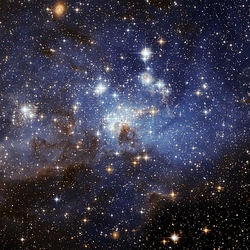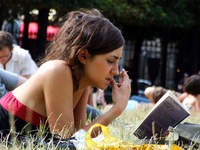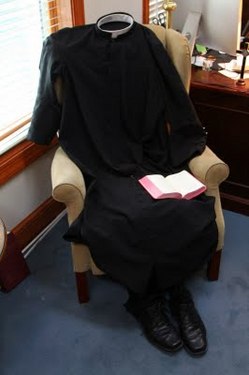Yesterday, Pope Benedict addressed members attending the Plenary meeting of the Pontifical Academy of Sciences in the Clementine Room at the Apostolic Palace. The tells us that faith and reason are not in opposition to each other, that we don’t make and sustain ourselves and that our work is valuable in trying to understand human nature and our relationship with God.
Distinguished Ladies and Gentlemen,
I am happy to greet you, the members of the Pontifical Academy of Sciences, on the occasion of your Plenary Assembly, and I thank Professor Nicola Cabibbo for the words he has kindly addressed to me on your behalf.
In choosing the topic Scientific Insight into the Evolution of the Universe and of Life, you seek to focus on an area of enquiry which elicits much interest. In fact, many of our contemporaries today wish to reflect upon the ultimate origin of beings, their cause and their end, and the meaning of human history and the universe.

In this context, questions concerning the relationship between science’s reading of the world and the reading offered by Christian Revelation naturally arise. My predecessors Pope Pius XII and Pope John Paul II noted that there is no opposition between faith’s understanding of creation and the evidence of the empirical sciences. Philosophy in its early stages had proposed images to explain the origin of the cosmos on the basis of one or more elements of the material world. This genesis was not seen as a creation, but rather a mutation or transformation; it involved a somewhat horizontal interpretation of the origin of the world. A decisive advance in understanding the origin of the cosmos was the consideration of being qua being and the concern of metaphysics with the most basic question of the first or transcendent origin of participated being. In order to develop and evolve, the world must first be, and thus have come from nothing into being. It must be created, in other words, by the first Being who is such by essence.
To state that the foundation of the cosmos and its developments is the provident wisdom of the Creator is not to say that creation has only to do with the beginning of the history of the world and of life. It implies, rather, that the Creator founds these developments and supports them, underpins them and sustains them continuously. Thomas Aquinas taught that the notion of creation must transcend the horizontal origin of the unfolding of events, which is history, and consequently all our purely naturalistic ways of thinking and speaking about the evolution of the world. Thomas observed that creation is neither a movement nor a mutation. It is instead the foundational and continuing relationship that links the creature to the Creator, for he is the cause of every being and all becoming (cf. Summa Theologiae, I, q.45, a. 3).

To “evolve” literally means “to unroll a scroll”, that is, to read a book. The imagery of nature as a book has its roots in Christianity and has been held dear by many scientists. Galileo saw nature as a book whose author is God in the same way that Scripture has God as its author. It is a book whose history, whose evolution, whose “writing” and meaning, we “read” according to the different approaches of the sciences, while all the time presupposing the foundational presence of the author who has wished to reveal himself therein. This image also helps us to understand that the world, far from originating out of chaos, resembles an ordered book; it is a cosmos.
Notwithstanding elements of the irrational, chaotic and the destructive in the long processes of change in the cosmos, matter as such is “legible”. It has an inbuilt “mathematics”. The human mind therefore can engage not only in a “cosmography” studying measurable phenomena but also in a “cosmology” discerning the visible inner logic of the cosmos. We may not at first be able to see the harmony both of the whole and of the relations of the individual parts, or their relationship to the whole. Yet, there always remains a broad range of intelligible events, and the process is rational in that it reveals an order of evident correspondences and undeniable finalities: in the inorganic world, between microstructure and macrostructure; in the organic and animal world, between structure and function; and in the spiritual world, between knowledge of the truth and the aspiration to freedom. Experimental and philosophical inquiry gradually discovers these orders; it perceives them working to maintain themselves in being, defending themselves against imbalances, and overcoming obstacles. And thanks to the natural sciences we have greatly increased our understanding of the uniqueness of humanity’s place in the cosmos.
The distinction between a simple living being and a spiritual being that is capax Dei, points to the existence of the intellective soul of a free transcendent subject. Thus the Magisterium of the Church has constantly affirmed that “every spiritual soul is created immediately by God – it is not ‘produced’ by the parents – and also that it is immortal” (Catechism of the Catholic Church, 366). This points to the distinctiveness of anthropology, and invites exploration of it by modern thought.
Distinguished Academicians, I wish to conclude by recalling the words addressed to you by my predecessor Pope John Paul II in November 2003: “scientific truth, which is itself a participation in divine Truth, can help philosophy and theology to understand ever more fully the human person and God’s Revelation about man, a Revelation that is completed and perfected in Jesus Christ. For this important mutual enrichment in the search for the truth and the benefit of mankind, I am, with the whole Church, profoundly grateful”.
Upon you and your families, and all those associated with the work of the Pontifical Academy of Sciences, I cordially invoke God’s blessings of wisdom and peace.


